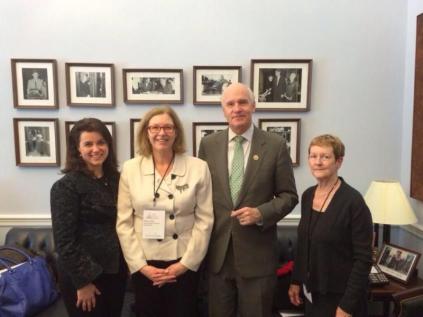By Guest Author: Kaitlyn Bean of SkillWorks
For many community based organizations, involvement in public policy advocacy can be a daunting endeavor, meant only for policy wonks and experts who know all the physical and political in’s and out’s of state and local legislatures – not true! Especially for social issue-focused organizations, which tend to be part of larger systems that may require more resources, support, and changes to those systems in order to work toward solving or improving a particular problem and/or serve a particular population. This calls for active civic engagement and advocacy to tell representatives why they should care about and support your cause(s)! But where to start? Here are 4 ways your organization can get involved in policy advocacy or improve your current advocacy strategy:
1. Reach Out.
Find out who your state legislators are and reach out to them! Elected officials are public servants, meant to represent and answer to their constituents – that’s you! So it’s your responsibility to reach out and tell your legislators what is important to you, your fellow constituents, and why it should be important to your legislators.
Check out this past blog post that provides a detailed overview of the Massachusetts State Budget process, and how you can impact budget and other policy decisions.

Gov. Charlie Baker signing the FY15 Massachusetts state budget. Credit: Mike Deehan / WGBH News
2. Be Specific and Relevant.
When advocating for a particular social issue and/or policy agenda, its most effective when you can point to a piece of related legislation, amendment, budget line item, etc. that’s being debated and explain your/your organization’s position on that item, and specifically how and when that legislator can be supportive. Whether its voting a particular way, co-signing an amendment or advocating their support on the Senate or House Floor – be specific about what you’re asking for and how they can help.
To stay up to date on floor debates, votes and other legislative activities related to your issue(s), it’s a good idea to regularly check out the legislative calendars to know when and who you should be reaching out to advocate for your issue(s).

Massachusetts State Senate Chamber. Credit:https://malegislature.gov/People
You can also click here to download a helpful flow-chart of Massachusetts’ annual state budget process.
Another helpful tool is the Massachusetts Jobs & Workforce Budget browser which provides a detailed look at current and past funding levels for specific workforce-related line items in the state budget.
Current Workforce Action Alert: The FY17 MA State budget is still being finalized and there are key workforce-related line items that need YOUR advocacy! Click here to find out which line items to advocate for and who to call!
3. Know Your Stuff.
It’s critical to back up your advocacy with facts and data proving to legislators why your issue is so important and in need of their support. Providing this information also helps legislators to better understand your issue and how it might affect their constituents. If you’re advocating for funding, it’s even better if you can provide data that shows the return on investment in your issue.
Equally as important is knowing enough about your issue and its needs to make recommendations for legislation, policy/system changes, resource allocation, funding increases, etc. and explaining why and how those recommendations will make a positive impact on your issue and the people it affects.
Great workforce development examples include the Job Training Alliance (JTA)’ssocial return on investment report on the success of community based job training programs and the Alliance for Vocational Technical Education (AVTE)’s CVTE reportand policy recommendations.
4. Change it up.
Don’t just stick to calling and/or emailing legislators to advocate for your issue(s) or only reaching out when its budget season or when legislators are debating a relevant piece of legislation. Engage with legislators regularly, using a variety different means and methods.
Here’s a few ideas your organization can try:
- Invite legislators to your programs and build an ongoing relationship with them
- Promote their visit or your trip to their office on social media
- Thank them for visiting and meeting with you
- Promote graduations on social media and to local newspapers and ‘patch’ sites
- Give awards to employers and legislators that use best practices and support your priorities
- Follow policy makers and local reporters on Twitter, Instagram, and Facebook to cultivate relationships, promote your work, and thank them for their support.

Members of the Massachusetts congressional delegation visiting legislators’ offices in Washington, DC.
Most legislators WANT to hear from their constituents and want to be helpful and support good things happening in their districts. Especially when it comes to helping people get jobs, which is a TOP priority for most policy makers and legislators. So NOW is your chance to get out there, make your and your organization’s voice heard, and ADVOCATE for what matters to you!
And don’t forget to use these tactics to help support and advocate for Massachusetts’ new workforce development policy campaign: Skills to Succeed. Click here to learn more about the campaign and our recommendations to drastically increase career growth and opportunity in Massachusetts.




Comments are closed.